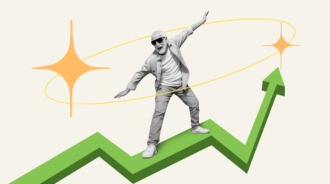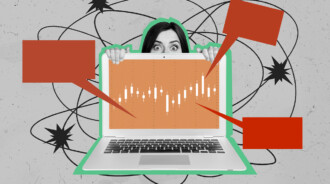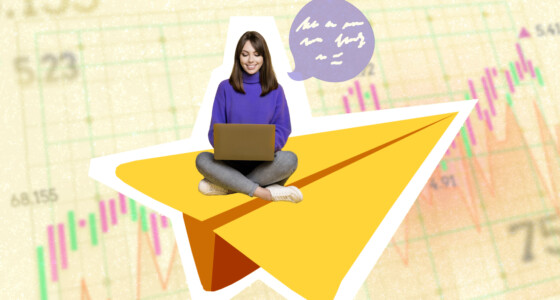

Stock market trading is not for the faint-hearted but can be quite rewarding. The great thing for aspiring traders is that they have a vast resource of trading quotes from experts in the field.
Trading quotes are brilliant one-liners that are often repeated around the trading circle. They sound sharp and on point, so traders love to use them. But what did the authors mean when they wrote these words of trading wisdom?
These trading quotes inspire you and help you develop practical trading solutions. They can even get you out of a sticky situation!
That’s only possible if you have a deeper understanding of the quotes, and that’s what this article is all about. Below you’ll find the 15 best trading quotes of all time and what each quote means.
Let’s start with a famous quote attributed to none other than the father of modern macroeconomics.
#1 – John Maynard Keynes: “Markets can remain irrational longer than you can remain solvent”
It means that markets change constantly. Asset price directions can shift. They may initially show strong signals that encourage you to follow the trend but suddenly change direction, going against your trading strategy.
If you ever find yourself unable to stop, adding more to your losses because you can’t give up your initial trading plan, always remember what Keynes said.
Even the most perfect market setup can fail. Market optimism is good, but you must learn to accept when you’re wrong. Losing is part of trading, but learning to limit your losses is the key.
Let’s explore market changes with the next quote from an American investor and trading guru.
#2 – Michael Carr: “Don’t worry about what the markets are going to do; worry about what you will do in response to the markets”
Market changes are a given, so don’t waste your time and energy worrying about when or how the prices will shift because they will!
Instead, you should focus your resources on things you can control and use to mitigate (or even gain from) the effects of a choppy market. In other words, you should have plans A, B, and C to fall back on in the worst market conditions.
To get ahead in trading, you must be prepared for various situations. Don’t get fixed on one scenario. It helps to predetermine some signs that you should look for before executing a trade, such as:
- Under what conditions will you start buying or selling?
- How long should you hold?
- What are your predetermined stop-loss and take-profit levels?
- What are the conditions that will make you cancel your trading idea?
- What is your exit strategy?
If you have pre-set the factors that will trigger future trading decisions, you’ll learn to act less impulsively and become a more objective trader in the long run.
The next quote comes from one of the most elite investors, widely known for his massive one-way market bets.
#3 – George Soros: “It’s not whether you’re right or wrong that’s important, but how much money you make when you’re right and how much you lose when you’re wrong”
It is human nature to always want to be right. It will not happen in trading, so deal with it. Losing is as much a part of trading as profit. Your predictions can be either right or wrong, and there’s no other way around it. You can be right some of the time and wrong the other times. Your objective should always be maximizing your gains when you are right and minimizing your losses when you are wrong. The key is to keep a profitable position open long enough to maximize profit, but don’t delay closing a trade for a loss when you recognize a losing position.
It takes time to develop the gut feel and confidence that trading requires, but with time and experience, you will. Trading is a balancing act that you can master by sharpening your skills and tools. Constantly assess your profit/loss ratio, refine your trade enter/exit strategies, hone that gut feel, and learn to use it.
It’s one thing to cut your losses by promptly closing the trade for a loss; it’s another to lose big time by selling profitable positions too soon.
Next, let us share with you a painful trading subject – losing. The following two quotes come from two market wizards – one a stockbroker and the other a stock trader; both are professionals.

#4 – William O’Neil: “Letting losses run is the most serious mistake made by most investors”
We’ve already made this point, so why should we hammer it into this article? Simple – it bears repeating because traders often forget it, don’t take it seriously, or refuse to accept it.
Profit is about gaining more than you lose – a basic principle. Yet the temptation is always there to delay closing a losing trade slightly longer. If you lose sight of the bigger picture and keep holding a losing trading position, it will eat up whatever you’ve gained so far.
#5 – Marty Schwartz: “Learn to take losses. The most important thing in making money is not letting your losses get out of hand”
These trading giants know it firsthand. Even the most experienced traders will only have a profit rate of 45% to 60%. That’s so low, and don’t be surprised! It means that approximately half of your trades will be losses.
What’s crucial is to cut losses short and stop losing more money.
If you can’t take losses, it’s easy to get emotional and do revenge trading. That contradicts sound trading principles!
Before discussing this subject further, perhaps it’s time to introspect. Ask yourself whether you have a problem with loss-taking. Honestly!
Is it difficult for you to deal with a loss? Do you get emotional and tend to go straight away for the following trading setup hoping to recover a previous loss? That’s the worst thing you can do because it increases your risk, and you lose objectivity.
Here’s what you can do instead: After a loss, make it a point to stop looking at your charts. Stand up, clear your mind, call it a day, and resume afresh the following day.
That’s just one way of dealing with your emotions after a loss. We are sure you’ll find other (better) methods, and you should because losing is inherent to trading.
#6 – Peter Lynch: “In this business, if you’re good, you’re right six times out of ten. You’re never going to be right nine times out of ten”
Traders make between 45% – 60%, and investor/philanthropist Peter Lynch says that if you’re good, you get profit 60% of the time. So, it would be best if you were realistic in setting your goals. If you’re new to trading, it’s good to aim for a profit of 50% and a positive reward-to-risk ratio of 2:1.
Ensure that your trading plan outlines a potential profit of at least twice the amount of the possible loss. This way, it’s easier to realize a profit.
Don’t set your sights on earning 80% of the time because you’ll only get your hopes dashed. You cannot avoid losses, which will occur almost as often as profits.
The sooner you accept that, the less emotional and more objective you become as a trader.
#7 – Paul Tudor Jones: “Where you want to be is always in control, never wishing, always trading, and always first and foremost protecting yourself”
This trading quote is a reiteration of the importance of a sound trading plan. It must spell out the possibilities that will trigger trading entries and exits in uncertain terms.
There should be no room for subjective “I wish”, “what if”, or “if only” lines of thinking. It would be best to have clear trading rules outlining your predetermined moves to lessen losses and maximize profits.
Jones tells you to “protect yourself”, reminding you that your plan should include stop-loss, money management, and other safeguards.
#8 – Nicolas Darvas: “I believe in analysis, not forecasting”
Trading is based on technical analysis; otherwise, it will just be another form of gambling. Traders must be objective, working with a trading plan and constantly monitoring market movements. They analyze chart patterns and market trends, looking for specific signals on which they base their next move and trading strategies.
As opposed to forecasting, trading is objective and technical. Yet, forecasting is what some traders tend to do. They hold onto their trade idea no matter what, regardless of data and market signals, which is foolhardy.
For amateur traders, always start right – avoid the forecasting approach.
#9 – Jesse Livermore: “Money is made by sitting, not trading”
By “sitting”, Livermore doesn’t mean “doing nothing” but rather “waiting” for the right conditions to arise before buying or selling. It underscores the importance of monitoring market shifts and looking for signals as you wait.
Trading is a test of your patience and the confidence you have in your plan. When you can sit and wait calmly, your entry or exit strategies are in place.
His reminders are clear. Don’t jump into the market too soon; stick to your trading rules, and wait for the right trade setups before moving.
#10 – Jack Schwager: “The hard work in trading comes in the preparation. The actual process of trading, however, should be effortless”
Trader and author of several books, including The Market Wizards, Jack Schwager, emphasizes the importance of trading preparation. Trading is the application of all the pre-set rules, trading plans, testing and refining of strategies, and everything else you have prepared ahead of time. That’s all the hard work!
What’s left is for you to sit and watch your charts and execute your pre-planned trade actions based on anticipated potential conditions. It’s like a play where the stage, props, and everything are prepared, and all the actors follow the script.
#11 – Steve Clark: “Do more of what works and less of what doesn’t”
This quote seems like a no-brainer, but surprisingly, traders often fail because they do more of what doesn’t work and less of what works. What are you good at in trading? Go over your trading journal and evaluate your strengths. Are you more successful at executing well-planned long-term positions? Then do more of those!
What trade size are you comfortable with? Then trade within those bounds. Clark also said that you should only trade within your emotional capacity. Your exposure shouldn’t be so significant that you’re overcome by fear. Fear clouds judgment, and that is not good for trading.
This quote implies that you should evaluate your record of past trade profits and losses. Analyze your trading patterns and identify gaining and losing trades. Then do more of your successful trades because they will more likely work!
The following quote is related to what Steve Clark said about trading only within your emotional capacity.
#12 – Joe Vidich: “Limit your size in any position so that fear does not become the prevailing instinct guiding your judgment”
Emotions, including those of fear and revenge, are detrimental to trading. Deciding out of anxiety due to a trade size too large or a risk too high can endanger your position.
A word of advice if you’re new to trading: Don’t risk more than 1 percent of your total trading capital on a single trade. Try lower if you still struggle or are stressed trading 1%. The key is finding a level where you can confidently trade without fear, anger, desperation, greed, or impulsiveness.
The last three quotes in this list are directed toward a trader’s character, composure, and personal tendencies.
#13 – Mark Douglas: “If you can learn to create a state of mind unaffected by the market’s behavior, the struggle will cease to exist”
Your trading mindset should be mind over matter. Always be prepared for market price changes, and don’t waste your time getting agitated when the wind goes against you.
As Michael Carr said: “Don’t worry about what the markets are going to do” because those are beyond your control. If the prices go against you, there’s no way you can turn things around – regardless of how much you stress over it.
The good thing is that you have a trade plan and strategies to get you out of a sticky situation. In other words, you can manage your trade without getting emotional.
If you’re feeling overwhelmed, giving yourself a break is okay. Come back another day with a fresh eye on the situation.
#14 – Yvan Byeajee: “Trading doesn’t just reveal your character, it also builds it if you stay in the game long enough”
Byeajee is not only a seasoned trader but also a trading psychology consultant. On his website, he puts emphasis not only on trading principles that ensure consistent profits but also on improving the person.
And why not? As Dr. Alexander Elder said: “The trader is the weakest link in any trading system”, so traders must seek self-improvement.
For starters, you can work on the following aspects:
- Practice mindfulness exercises to improve clarity of mind.
- Learn the art of waiting to teach yourself to be more patient and less impulsive.
- Improve self-awareness to know your emotional triggers and develop self-control.
- Develop a strong work ethic that will make you more confident in what you do.
With time and experience, you will slowly replace old habits and find yourself a stronger character than when you first took a deep dive into trading.
#15 – Anthony Robbins: “It’s not what we do occasionally that shapes our lives. It’s what we do consistently”
This last quote from business strategist and author Anthony Robbins neatly ties up many previous quotes. It applies to many aspects of life and business, including trading. This quote is interesting and valuable because there are two ways to appreciate it.
First, if you want to achieve something in life or your career, ensure that all your actions and efforts are consistently pointed toward that direction.
You’ll go nowhere if you take one giant step toward your goal but backslide most of the time. It’s your consistent action that will give you results.
Second, you can also read this quote another way. Don’t be so hard on yourself as you work towards your big dream. It’s OK to relax if you remain driven and focused on your goals. Sometimes you want to take it slow or take a breather – that’s fine! Take a day off or two but get back on track on day 3.
Say, you’ve been profitable trades for weeks on end, but one day you give in to an impulsive decision and lose. Your tendency might be to feel frustrated, and that’s normal, but don’t beat yourself up!
It is a setback that can teach you something, so learn from it but don’t dwell on it. Again, not what you do occasionally will make or break your career.
The Bottom Line
People love to pass around trading quotes and share them on social media because these one-liners are inspiring and valuable when you need guidance. That’s the reason they are so popular.
However, trading quotes can sometimes be taken out of context and lose meaning. So next time you read a quote, look it up, find the author’s exact words, and carefully internalize its deeper meaning.
I hope you enjoyed and learned from our top 15 trading quotes – wishing you fruitful trades!













